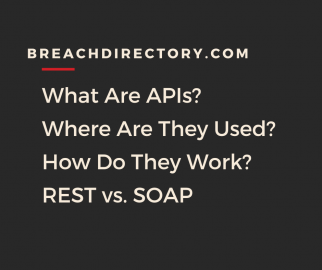All developers building software for the web have heard about Application Programming Interfaces, or, as they are also called, APIs. In this blog, we tell you a little more about them.
What are APIs?
The entire essence of APIs is to make a call to the server from the client, receive data, and display it. In other words, REST APIs work by fetching requests for a specific data set from a database, then returning all information relevant to the data set that was requested. However, there’s one more type of an API that is very frequently discussed – the SOAP API.
SOAP translates to Simple Object Access Protocol, and, as the name suggests, it’s a little more complex than REST is – organizations usually use SOAP because they either require more comprehensive security measures, ACID (Atomicity, Consistency, Isolation, Durability) compliance, or because someone’s building an application that needs to interact with a legacy system.
SOAP APIs are easily differentiable from their REST counterparts by simply looking at the code of the application – if an API is of SOAP type, the request to the API should be provided in an XML request body.
Where are APIs Used?
Organizations frequently make use of APIs in a couple of scenarios:
- Login Interfaces – APIs are frequently used as companions to popular log in interfaces allowing people to log in to Facebook, Instagram, Twitter, LinkedIn, or other prominent social media websites with just the click of a button. Convenient, right?
- Banking – remember the last item you bought through eBay or Amazon? The moment you’ve clicked a button, a call to an API was made, and that call allowed you to complete a transaction. You didn’t even think about that, did you? That’s how easy APIs make your work!
- The Travelling Industry – most airfare and hotel searching websites make use of APIs in order to show the best deals.
- The automobile industry – think of car manufacturers like Nissan or Tesla for example. There’s a very good chance that these cars are getting their updates transferred via the call of an API.
- The entertainment industry – think of Netflix, Amazon Prime, or Hulu. Chances are that all of those platforms also use APIs to help you find content that interests you based on movies you’ve watched in the past or by you using the search engines available on those websites.
- The information security industry – the website you’re reading a blog right now on – yes, BreachDirectory – also makes use of API capabilities to show data from a database. BreachDirectory makes use of the capabilities presented by APIs in order to show people information pertaining to their risk of identity theft on the web. The API is being implemented in a very wide variety of industries from information security to online shopping – and it helps stop identity theft attacks both during the day and during the night.
By now, you should have a pretty good grasp about Application Programming Interfaces. The question is – will the capabilities provided by them help your applications thrive and succeed? And the most likely answer, unsurprisingly, is yes. Think about it – APIs are everywhere. If we judge by the use cases mentioned above, we can already see that the capabilities of APIs help a wide variety of industries and have a wide variety of use cases. APIs are already heading our way and it’s only a matter of time before an API is implemented into the company you happen to work at.The API of BreachDirectory is also helping numerous companies to put their security first – the BreachDirectory API lets companies search through hundreds of data breaches and secure their team in seconds. With an unlimited amount of requests, you will always be the first to know whether hackers are threatening the wellbeing of the infrastructure of your company. Don’t let your company be the next one in the list of leaked data breaches – implement a data breach API to be safe. Finally, the capabilities provided by the API might not be for everyone – if that’s the case, make sure to run a search through the data breach search engine to stay on the safe side. Until next time!
